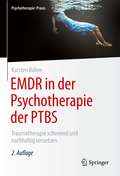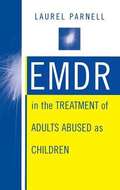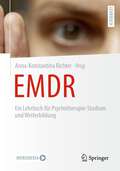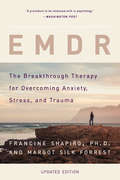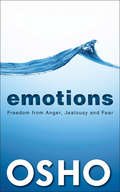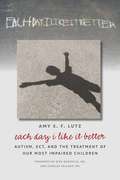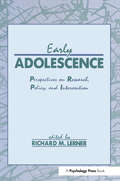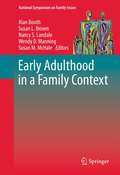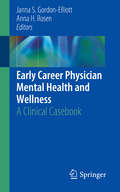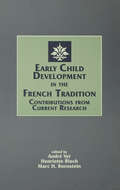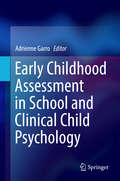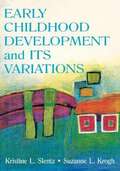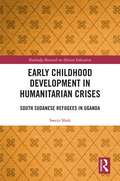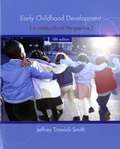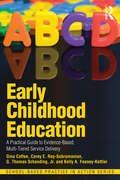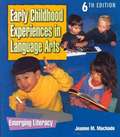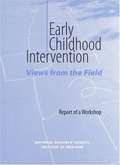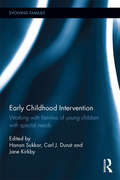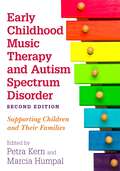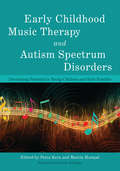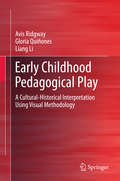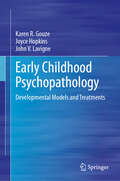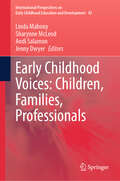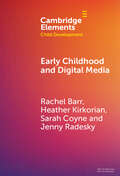- Table View
- List View
EMDR in der Psychotherapie der PTBS: Traumatherapie schonend und nachhaltig umsetzen (Psychotherapie: Praxis)
by Karsten BöhmDieses Buch zeigt, wie psychologische und ärztliche Psychotherapeuten EMDR in der Traumatherapie einsetzen können. Die Psychotherapie der Posttraumatischen Belastungsstörung (PTSD, PTBS) konfrontiert Patienten mit grausamen und oft schwer zu ertragenden Bildern und Erinnerungen, um ihnen die Verarbeitung dieser Erlebnisse zu ermöglichen. Patienten sagen dabei, dass sie sich leicht auf EMDR einlassen können – es gerne anwenden. Forschung und Praxis bestätigen, dass Therapieabbrecher bei EMDR selten sind. Die WHO hat EMDR längst anerkannt. Fachleute erfahren in diesem Buch, wie sie EMDR in ihre Therapie integrativ einbauen können und welche Besonderheiten zu berücksichtigen sind – auch bei komplexen Fällen und bestehenden Komorbiditäten. Dabei liegt der Schwerpunkt auf der Anwendung – Fallbeispiele verdeutlichen die komplexe EMDR-Therapie, der Text ist leicht verständlich aufgebaut. Mit einem Geleitwort von Dr. Arne Hofmann. Geschrieben für … … Psychologische Psychotherapeuten (sowohl verhaltenstherapeutisch als auch tiefenpsychologisch orientiert), Traumatherapeuten, Ärzte, Psychotherapeuten in der Ausbildung. Der Autor: Dr. phil. Dipl.-Psych. Karsten Böhm, Trainer und Supervisor für EMDR und Verhaltenstherapie; Leitender Psychologe an der Klinik Friedenweiler im Schwarzwald und 1. Vorsitzender von EMDRIA Deutschland.
EMDR in the Treatment of Adults Abused as Children
by Laurel ParnellThis book shows therapists how to integrate EMDR (eye movement desensitization and reprocessing) into the treatment so that adults who have been abused as children clear their trauma more rapidly, escape falling into the victim mentality, and proceed to lead full, productive lives. For therapists already familiar with EMDR, it covers the primary treatment issues and symptomatology of these clients and specific alterations of the standard EMDR protocol. For therapists experienced with treating abuse survivors, it introduces a safe and effective way to process trauma. <p><p> Emphasizing the practical, Laurel Parnell not only teaches many techniques to help the therapist when an impasse is reached, but also provides a selection of treatment choices. She demonstrates how EMDR can be used in the beginning phase of therapy for ego strengthening and the development and installation of resources. This prepares clients for trauma processing in the middle phase. Finally, in the end phase, clients integrate their experiences and often feel an awakening of their creativity and spirituality. Cases are used throughout to provide therapists with a deeper, more grounded understanding of different kinds of abuse cases and their treatment.
EMDR: Ein Lehrbuch für Psychotherapie-Studium und Weiterbildung
by Anna-Konstantina RichterForschungsergebnisse wie die von Martin Sack (2018) beschreiben die hohe Effektstärke von EMDR in der Behandlung der PTBS und deuten darauf hin, dass auch weitere psychische Störungen mit traumafokussierenden Methoden behandelt werden sollten.In diesem kompakten Lehrbuch erhalten Studierende sowie angehende Psychotherapeut*innen und Berufsanfänger*innen einen praxisnahen Überblick über Grundlagen und Anwendung sowie Aus- und Fortbildungsmöglichkeiten zur Methode EMDR.Die Inhalte wurden von erfahrenen EMDR-Anwender*innen sowie jungen angehenden Psychotherapeut*innen eindrücklich anhand zahlreicher Fallbeispiele und prüfungsnah anhand von Kontrollfragen an jedem Kapitelende verfasst.
EMDR: The Breakthrough Therapy for Overcoming Anxiety, Stress, and Trauma
by Francine Shapiro Margot Silk ForrestWhen EMDR was first published in 1997, it was hailed as the most important method to emerge in psychotherapy in decades. In the twenty years since, Eye Movement Desensitization and Reprocessing (EMDR) therapy has successfully treated psychological problems for millions of sufferers worldwide. In this updated edition, Francine Shapiro offers a new introduction that presents the latest applications of this remarkable therapy, as well as new scientific data demonstrating its efficacy. Drawing on the experiences of thousands of clinicians as well as a vast research literature on depression, addiction, PTSD, and other disorders, she explainshow life experiences are physically stored in our brains, making us feel and act in harmful ways, and how EMDR therapy can bring relief, often in a remarkably short period of time. Applicable to survivors of trauma as well as people suffering from phobias and other experience-based disorders, EMDR is essential reading for anyone who seeks to understand why we hurt, how we heal, and how we get better.
EMOTIONS
by Osho Osho International FoundationStrong emotions that we don't know how to handle effectively lie at the core of so many difficulties in the life of the individual. They can affect our relationships with loved ones, and how we function in our work. They play a profound role in how we feel about ourselves, and can even affect our physical health. And we are too often trapped in the dilemma of "expression" versus "repression." Expressing our emotions can often hurt others, but by repressing them - even in the benevolent guise of "self-control" - we risk hurting ourselves.Osho offers a third alternative, which is to understand the roots of our emotions and to develop the knack of watching them and learning from them as they arise, rather than being "taken over" by them. Eventually we find that even the most challenging and difficult situations no longer have the power to provoke us and cause us pain.Osho's unique insight into the workings of the mind, the heart, and the essence or "being" of the individual goes far beyond the understandings of conventional psychology. Over more than three decades of work with people from all walks of life, he has developed simple techniques and insights to help modern-day men and women to rediscover their own inner silence and wisdom.
Each Day I Like It Better: Autism, ECT, and the Treatment of Our Most Impaired Children
by Amy LutzIn the fall of 2009, Amy Lutz and her husband, Andy, struggled with one of the worst decisions parents could possibly face: whether they could safely keep their autistic ten-year-old son, Jonah, at home any longer. Multiple medication trials, a long procession of behavior modification strategies, and even an almost year-long hospitalization had all failed to control his violent rages. Desperate to stop the attacks that endangered family members, caregivers, and even Jonah himself, Amy and Andy decided to try the controversial procedure of electroconvulsive therapy or ECT. Over the last three years, Jonah has received 136 treatments. His aggression has greatly diminished, and for the first time Jonah, now fourteen, is moving to a less restricted school. Each Day I Like It Better recounts the journeys of Jonah and seven other children and their families (interviewed by the author) in their quests for appropriate educational placements and therapeutic interventions. The author describes their varied, but mostly successful, experiences with ECT. A survey of research on pediatric ECT is incorporated into the narrative, and a foreword by child psychiatrist Dirk Dhossche and ECT researcher and practitioner Charles Kellner explains how ECT works, the side effects patients may experience, and its current use in the treatment of autism, catatonia, and violent behavior in children.
Each Day I Like It Better: Autism, ECT, and the Treatment of Our Most Impaired Children
by Amy S. LutzIn the fall of 2009, Amy Lutz and her husband, Andy, struggled with one of the worst decisions parents could possibly face: whether they could safely keep their autistic ten-year-old son, Jonah, at home any longer. Multiple medication trials, a long procession of behavior modification strategies, and even an almost year-long hospitalization had all failed to control his violent rages. Desperate to stop the attacks that endangered family members, caregivers, and even Jonah himself, Amy and Andy decided to try the controversial procedure of electroconvulsive therapy or ECT. Over the last three years, Jonah has received 136 treatments. His aggression has greatly diminished, and for the first time Jonah, now fourteen, is moving to a less restricted school. Each Day I Like It Better recounts the journeys of Jonah and seven other children and their families (interviewed by the author) in their quests for appropriate educational placements and therapeutic interventions. The author describes their varied, but mostly successful, experiences with ECT. A survey of research on pediatric ECT is incorporated into the narrative, and a foreword by child psychiatrist Dirk Dhossche and ECT researcher and practitioner Charles Kellner explains how ECT works, the side effects patients may experience, and its current use in the treatment of autism, catatonia, and violent behavior in children.
Early Adolescence: Perspectives on Research, Policy, and Intervention (Penn State Series on Child and Adolescent Development)
by Richard M. LernerThis volume brings together a broad group of scholars from a diverse array of disciplines to write integratively about cutting-edge research issues pertinent to various facets of the study of early adolescence. All contributors speak to the idea of interdisciplinary integration as a means of advancing knowledge in particular focus areas of early adolescence; all approach their topic with an orientation to integrating levels of organization. In so doing, they testify to the importance of two interrelated integrations -- multidisciplinary and multiprofessional -- for furthering understanding of young adolescents.
Early Adulthood in a Family Context
by Alan Booth Nancy S Landale Susan M Mchale Wendy D. Manning Susan L. BrownEarly Adulthood in a Family Context, based on the 18th annual National Symposium on Family Issues, emphasizes the importance of both the family of origin and new and highly variable types of family formation experiences that occur in early adulthood. This volume showcases new theoretical, methodological, and measurement insights in hopes of advancing understanding of the influence of the family of origin on young adults' lives. Both family resources and constraints with respect to economic, social, and human capital are considered.
Early Career Physician Mental Health and Wellness: A Clinical Casebook
by Janna S. Gordon-Elliott Anna H. RosenThis casebook tackles the common psychiatric illnesses that physicians experience during these early stages of their careers. The cases carefully present guidelines for assessment and management, along with clinical pearls and resources for further reference. Written by experts in the field, the text is designed to be valuable for physicians engaged in medical education and training, and specifically for the psychiatrists who provide care for other physicians. Each chapter includes a unique case and discussion. Topics include: onset of a mood and or psychotic disorder, life transitions, trauma in care, physician suicide, anxiety, and other issues that are part of the experience of young adults developing their personal and professional identities. Early Career Physician Mental Health and Wellness is an excellent guide for all physicians interested in mental health and wellness, including psychiatrists, psychologists, training directors, hospital leadership, mentors, students, residents, and others.
Early Child Development in the French Tradition: Contributions From Current Research
by Marc H. Bornstein André Vyt Henriette BlochThis volume shares significant contemporary "Francophone" contributions to developmental psychology outside geographic and intellectual borders of French-speaking countries. Except for the spread of Piagetian theory after World War II into Anglophone psychology, these new publications have not become so well known worldwide as progress in Francophone developmental psychology warrants. However, the work of a new generation of developmental theorists and experimentalists continues to shape important and original lines of thinking and research in France, Canada, and in other French-speaking countries. This work also contributes uniquely to issues such as sensori-motor development, perception, language acquisition, social interaction, and the growth and induction of cognitive mechanisms. Scientific concepts are not only embedded in a paradigm, but also in a culture and a language. Instead of writing about Francophone developmental psychology from "outside," this volume brings together original English-language contributions written by researchers working in different Francophone countries. Chapters summarize and interpret research on a given topic, making explicit the context of philosophical and theoretical traditions in which the empirical advances are embedded. Original essays are accompanied by editorial commentaries from eminent scientists working on the same topics in other parts of the world -- topics that are closely related to Francophone streams of thought and themes of study. Together, these essays fully and faithfully represent modern scientific perspectives toward understanding many facets of mental growth and development of the young child.
Early Childhood Assessment in School and Clinical Child Psychology
by Adrienne GarroThis book presents an integrated and coordinated framework for assessing developmental, psychological, and behavioral disorders in early childhood. Expert contributors advocate for natural-environment methods in addition to standardized measures in assessing academic and social skills as well as age-specific behavior problems in young children. Chapters model collaborations between clinicians, family, and daycare and school personnel, address diagnostic and classification issues, and conceptualize assessment as flexible, ongoing, and, as necessary, leading to coordinated services. The book gives practitioners and researchers critical tools toward establishing best practices in an increasingly complex and important area, leading to better prevention and intervention outcomes. Included in the coverage: Standardized assessment of cognitive development. Authentic and performance-based assessment. The use of Response to Intervention (RTI) in early childhood. Collaboration in school and child care settings. Anxiety disorders, PTSD, OCD, and depression in young children. Sleeping, feeding/eating, and attachment problems in early childhood. Early Childhood Assessment in School and Clinical Child Psychology is an essential resource for clinicians and related professionals, researchers, and graduate students in child and school psychology; assessment, testing, and evaluation; occupational therapy; family studies, educational psychology; and speech pathology.
Early Childhood Development And Its Variations
by Suzanne L. Krogh Kristine L. SlentzProvides an overview of development, then describes principles and sequences of physical, cognitive, and social/emotional development at the infant, toddler, preschool, and primary levels. Individual differences and developmental norms are stressed throughout.
Early Childhood Development in Humanitarian Crises: South Sudanese Refugees in Uganda (Routledge Research on African Education)
by Sweta ShahThis book provides an analysis of Early Childhood Development (ECD) in South Sudanese refugee camps in Uganda, making the case for the design and implementation of programmes for ECD in emergency situations. Illustrating the current place of ECD in the humanitarian landscape and the environment in which South Sudanese refugees in Uganda currently live, this book combines child and human development perspectives to underpin the importance of ECD in emergencies. Developing an ECD tool specific to the cultural context and emergency situation, the author examines the outcomes of an ECD programme focused on refugee children and provides evidence for increased investment into ECD in emergencies. Contributing to the evidence base for Early Childhood Development, this book will be of interest to students, scholars and practitioners who conduct research on ECD, education or humanitarianism in developing countries.
Early Childhood Development: A Multicultural Perspective
by Jeffrey W. Trawick-SmithEarly Childhood Development: A Multicultural Perspective, Fifth Edition addresses both typical and atypical child development from birth through age eight. This text highlights the diversity of child development, preparing professionals to meet the unique needs of children from a wide variety of backgrounds.
Early Childhood Education: A Practical Guide to Evidence-Based, Multi-Tiered Service Delivery (School-Based Practice in Action)
by Gina Coffee Corey E. Ray-Subramanian G. Thomas Schanding, Jr. Kelly A. Feeney-KettlerIn the past several years, models of multi-tiered service delivery have emerged as a framework for supporting the needs of school-aged children in schools across the country and have received much attention in scholarly publications of education and related fields. Despite the needs of young children and the promise of early intervention, however, models of multi-tiered service delivery are only in the beginning stages of development in early childhood education settings such as preschools. This text provides early-childhood professionals with an introduction to tiered service delivery and practical considerations in the implementation of a multi-tier system of supports with particular emphasis on early childhood law and ethics, assessment and intervention, developmental disabilities, and family engagement.
Early Childhood Experiences in Language Arts: Emerging Literacy (6th Edition)
by Jeanne M. MachadoEarly Childhood Experiences in Language Arts: Emerging Literacy is a must-have resource on language arts instruction for young children. Combining current research and appropriate early childhood practices, it fosters an understanding of how techniques and planned programs affect children's language development. Rich in examples and activities, no teacher, child care provider, or parent should be without this invaluable resource.
Early Childhood Intervention: Views from the Field
by Committee on Integrating the Science of Early Childhood DevelopmentA report on Early Childhood Intervention
Early Childhood Intervention: Working with Families of Young Children with Special Needs (Evolving Families)
by Hanan Sukkar Carl J. Dunst Jane KirkbyEarly childhood is considered a critical but often vulnerable period in a child’s development where early identification and intervention can be crucial for improving children’s developmental outcomes. Systems and family-centred perspectives are vital to support families and build their capacities to lead normalized lives with improved family quality of life. This book explores the family-centred practices and systems factors which influence families’ experiences raising children with complex needs. It also considers the ways in which professionals can work with families to build and support parent and child competence. Conceptual and practical work from Australia, Canada, Europe and the United States present descriptions of and implications for different family system frameworks and early-childhood programs. Contributors in this edited volume bring together contemporary information that bridges the research to practice gap in supporting families of young children with disabilities or delays. Chapters include: Early Intervention for Young Children with Developmental Delays: Contributions of the Developmental Systems Approach Family Composition and Family Needs in Australia: What Makes a Family? Working with Families in Early Childhood Intervention: Family-Centred Practices in an Individualised Funding Landscape Family Systems and Family-Centred Intervention Practices in Portugal and Spain: Iberian Reflections on Early Childhood Intervention This book will attract the attention scholars of Parenting and Families; Child Development and Childcare.
Early Childhood Music Therapy and Autism Spectrum Disorder, Second Edition: Supporting Children and Their Families
by Hayoung A. Lim Linda Martin Marcia Humpal Petra Kern Alan Turry Angela M. Snell Jennifer Whipple Linn Wakeford Mike D. Brownell Nina Guerrero Darcy DeLoach Edward T. Schwartzberg Blythe LaGasse Lori Lundeen-SmithThis extended edition offers a comprehensive understanding of music therapy practice for young children with Autism Spectrum Disorder (ASD) and their families. Drawing on recent research and rigorous scientific evidence, it spans topics such as effective interventions, diagnostic criteria, managing sensory processing issues, inclusion and advocacy.
Early Childhood Music Therapy and Autism Spectrum Disorders
by Edited by Petra Kern Marcia HumpalThis comprehensive book includes an overview of recent developments in ASD and effective music therapy interventions based on ASD-specific approaches, instructional strategies and techniques for use in children's natural environments. Therapists wishing to conduct family-centered practice and to support parents integrate music into home routines will find a wealth of information, together with insights from music therapists who are parents of children with ASD. The book also looks at collaboration and consultation with interdisciplinary team members, including early childhood educators, speech-language pathologists and occupational therapists. Case scenarios, examples, checklists, charts, tip sheets, music scores, and online resources make this book accessible for everyone. Throughout the book's sixteen chapters, renowned experts share knowledge and practical applications that will give music therapists, students, professionals, educators, families and anyone interested in working with young children with ASD, a detailed understanding of the implementation and range of music therapy practices that can benefit these children and their families.
Early Childhood Pedagogical Play
by Avis Ridgway Gloria Quiñones Liang LiThis book re-theorizes the relationship between pedagogy and play. The authors suggest that pedagogical play is characterized by conceptual reciprocity (a pedagogical approach for supporting children's academic learning through joint play) and agentic imagination (a concept that when present in play, affords the child's motives and imagination a critical role in learning and development). These new concepts are brought to life using a cultural-historical approach to the analysis of play, supported in each chapter by visual narratives used as a research method for re-theorising play as a pedagogical activity. Whenever a cultural-historical approach is applied to understanding pedagogical play, the whole context of the playful event is always included. Further, the child's cultural environment is taken into account in order to better understand their play. Children from different countries play differently for many reasons, which may include their resources, local cultural beliefs about play and specific pedagogical practices. The inclusion and acknowledgement of social, cultural and historical contexts gives credence and value to understanding play from both child and adult perspectives, which the authors believe is important for the child's learning and development. As such, the relationships that children and adults have with human and non-human others, as well as any connections with artefacts and the material environment, are included in all considerations of pedagogical play.
Early Childhood Psychopathology: Developmental Models and Treatments
by Karen R. Gouze Joyce Hopkins John V. LavigneThis book examines psychosocial risk factors contributing to the development and maintenance of psychopathology in early childhood. It draws on developmental psychopathology theory and research to discuss different approaches to the classification of early childhood emotional and behavioral disorders, address the importance of multidomain approaches to understanding risk factors for specific diagnoses, and examine the movement toward transdiagnostic conceptualizations. The book describes how multidomain models of risk factors can be integrated with transdiagnostic approaches to illuminate the development of general psychopathology, internalizing and externalizing symptoms, and singular symptom clusters of the most common early childhood disorders, including oppositional disorders, ADHD, anxiety, and depression. In addition, the volume highlights the implications of this approach for clinical treatment, training of child clinicians, and the development of public policy. Key areas of coverage include: A developmental psychopathology approach to early childhood mental health disorders and the development of multi-domain models of risk factors. Risk factors contributing to the development and maintenance of emotional and behavioral symptoms in early childhood. Transdiagnostic approaches and risk factors for general psychopathology as well as specific types of symptoms. Current treatments for disorders in early childhood and a novel integrative approach to treatment based on research findings. Training of child clinicians and social policy implications derived from the research program detailed in the book. Early Childhood Psychopathology is an essential resource for researchers, clinicians, scientist-practitioners, and graduate students in such fields as developmental, clinical child, and school psychology, child and adolescent psychiatry, social work, family studies, early childhood education, and all related disciplines.
Early Childhood Voices: Children, Families, Professionals (International Perspectives on Early Childhood Education and Development #42)
by Andi Salamon Sharynne McLeod Linda Mahony Jenny DwyerThis revolutionary book explores theoretical and practical issues of listening to children, families, and professionals who advocate for and work with young children to promote social justice and improve their lives, and to ensure no one is left behind. Listening to children is explored across multiple disciplines internationally and highlights the practical application of the United Nations Sustainable Development Goals in the context of the Convention on the Rights of the Child. The work explores innovations, theories, and partnerships, and draws on the voices of children, families, early childhood educators, speech-language pathologists, and multidisciplinary teams from across 17 countries to provide a shared vision for equity, peace and justice for all while integrating social environmental, economic, and dimensions of sustainability. Topics include giving children a voice; methods for listening to and documenting young children’s perspectives; listening to and working in partnership with families, educators, and professionals; and wellness and wellbeing of young children and their families across multiple dimensions.
Early Childhood and Digital Media (Elements in Child Development)
by Rachel Barr Heather Kirkorian Sarah Coyne Jenny RadeskyScreen time, defined as estimates of child time spent with digital media, is considered harmful to very young children. At the same time, the use of digital media by children under five years of age has increased dramatically, and with the advent of mobile and streaming media can occur anywhere and at any time. Digital media has become an integral part of family life. Imprecise global screen time estimates do not capture multiple factors that shape family media ecology. In this Element, the authors discuss the need to shift the lens from screen time measures to measures of family media ecology, describe the new Dynamic, Relational, Ecological Approach to Media Effects Research (DREAMER) framework, and more comprehensive digital media assessments. The authors conclude this Element with a roadmap for future research using the DREAMER framework to better understand how digital media use is associated with child outcomes.
